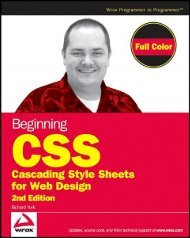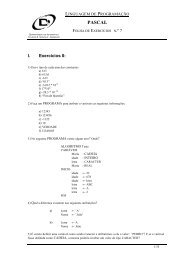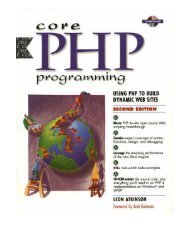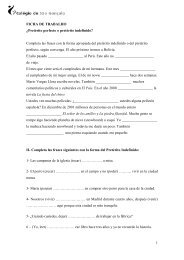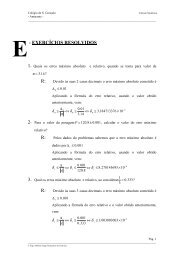- Page 1 and 2:
O Guia Definitivo do Yii 1.1 Qiang
- Page 3 and 4:
Coletando Entradas Tabulares! 59 Tr
- Page 5 and 6:
Primeiros Passos Visão Geral Esse
- Page 7 and 8:
• Added support for profiling SQL
- Page 9 and 10:
no desenvolvimento Web e da investi
- Page 11 and 12:
Página de Contato
- Page 13 and 14:
Página de Login A listagem seguint
- Page 15 and 16:
Conectando ao Banco de Dados A maio
- Page 17 and 18:
% cd WebRoot/testdrive % protected/
- Page 19 and 20:
Página de administração dos usu
- Page 21 and 22:
Conceitos Básicos Modelo-Visão-Co
- Page 23 and 24:
controle de acesso, benchmarking) a
- Page 25 and 26:
deny from all Componentes da Aplica
- Page 27 and 28:
3. Executa o controle; 8. Dispara o
- Page 29 and 30:
class UpdateAction extends CAction
- Page 31 and 32:
class PerformanceFilter extends CFi
- Page 33 and 34:
$this->render('edit', array( 'var1'
- Page 35 and 36:
A nomeclatura das visões do sistem
- Page 37 and 38:
Um evento pode ter diversos manipul
- Page 39 and 40:
forum/ ForumModule.php components/
- Page 41 and 42:
RootAlias.path.to.target Onde RootA
- Page 43 and 44:
Como não há suporte a namespaces
- Page 45 and 46:
5. Implemente ações e as visões.
- Page 47 and 48:
widgets that generate a lot of HTML
- Page 49 and 50:
class LoginForm extends CFormModel
- Page 51 and 52:
validação deverá ser efetuada; o
- Page 53 and 54:
Nesse trecho de código, temos uma
- Page 55 and 56:
public function rules() { return ar
- Page 57 and 58:
Nota: Para fazer com que a variáve
- Page 59 and 60:
A Página de Login com Erros A part
- Page 61 and 62:
NamePriceCountDescription
- Page 63 and 64:
usuário e senha para o acesso. Uma
- Page 65 and 66:
Depois que o método CDbCommand::qu
- Page 67 and 68:
Para mais detalhes sobre a vincula
- Page 69 and 70:
• where: specifies the WHERE part
- Page 71 and 72:
For example, array('in', 'id', arra
- Page 73 and 74:
join and its variants function join
- Page 75 and 76:
$sql = Yii::app()->db->createComman
- Page 77 and 78:
uild and execute the following SQL:
- Page 79 and 80:
CREATE TABLE `tbl_user` ( // `id` i
- Page 81 and 82:
the new column name. The query buil
- Page 83 and 84:
Below is an example showing how to
- Page 85 and 86:
Dica: Existem duas maneiras de trab
- Page 87 and 88:
class Post extends CActiveRecord {
- Page 89 and 90:
$post=Post::model()->find(array( 's
- Page 91 and 92:
Validação de Dados Ao inserir ou
- Page 93 and 94:
$model=Post::model(); $transaction=
- Page 95 and 96:
Named scopes podem ser parametrizad
- Page 97 and 98:
Informação: O suporte à chaves e
- Page 99 and 100:
Informação: Uma chave estrangeira
- Page 101 and 102:
$posts=Post::model()->with( 'author
- Page 103 and 104:
Informação: Quando o nome de uma
- Page 105 and 106:
Deve ser um vetor com pares nome-va
- Page 107 and 108:
The required name parameter specifi
- Page 109 and 110:
Sometimes, we may only want to appl
- Page 111 and 112:
yiic migrate up --migrationPath=ext
- Page 113 and 114:
• CZendDataCache: utiliza o Zend
- Page 115 and 116:
value irá expirar em 30 segundos /
- Page 117 and 118:
usuários. Para armazenar em cache
- Page 119 and 120:
A configuração acima, faz com que
- Page 121 and 122:
Nota: O path alias ext está dispon
- Page 123 and 124:
public function behaviors() { retur
- Page 125 and 126:
Controle Um controle, fornece um co
- Page 127 and 128:
• An extension should be self-con
- Page 129 and 130:
method invocations, we can start ou
- Page 131 and 132:
A console command should extend fro
- Page 133 and 134: Testes Visão Geral Note: The testi
- Page 135 and 136: $yiit='path/to/yii/framework/yiit.p
- Page 138 and 139: Tip: Having too many fixture files
- Page 140 and 141: public function testApprove() { //
- Page 142 and 143: class PostTest extends WebTestCase
- Page 144 and 145: array( ...... 'components'=>array(
- Page 146 and 147: array( 'posts'=>'post/list', 'post/
- Page 148 and 149: We first need to configure the Web
- Page 150 and 151: class UserIdentity extends CUserIde
- Page 152 and 153: Although Yii has measures to preven
- Page 154 and 155: The access rules are evaluated one
- Page 156 and 157: a permission that is atomic. For ex
- Page 158 and 159: $auth=Yii::app()->authManager; $aut
- Page 160 and 161: Default roles must be declared in t
- Page 162 and 163: WebRoot/ assets protected/ .htacces
- Page 164 and 165: eturn array( 'components'=>array( '
- Page 166 and 167: If we create a widget with a set o
- Page 168 and 169: To use message routing, we need to
- Page 170 and 171: array( ...... 'preload'=>array('log
- Page 172 and 173: Yii defines two exception classes:
- Page 174 and 175: Web Service Web service is a softwa
- Page 176 and 177: To complete the example, let's crea
- Page 178 and 179: class PostController extends CContr
- Page 180 and 181: When translating a message, its cat
- Page 182 and 183: '1#one book|n>1#many books' Plural
- Page 186 and 187: // body content for the widget //
- Page 188 and 189: Yii represents each console task in
- Page 190 and 191: yiic sitemap index --type=News --li
- Page 192 and 193: Cross-site scripting (also known as
- Page 194 and 195: etrieve the cookie with the specifi
- Page 196 and 197: Note: The scriptMap feature describ



